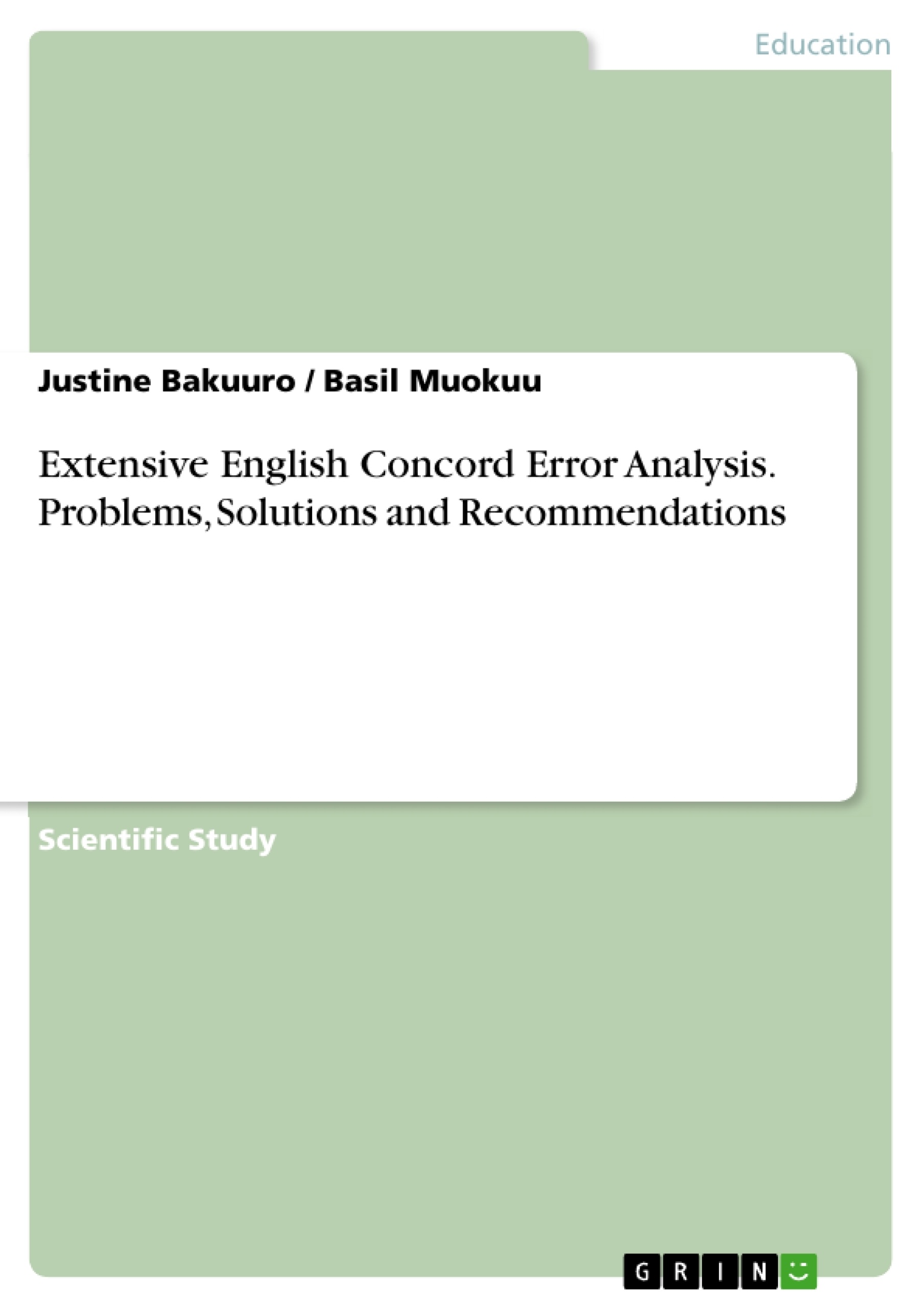This study reports the dominant linguistic errors that occur in the test items given to students of four Senior High Schools. The English sentence has a fairly strict word order and the elements that make up a sentence must be in concord, otherwise, the linear sequence becomes ungrammatical. This study investigated the degree of competence on concord in English attained by the Senior High School students in four selected schools in the Wa municipality of Ghana.
The need for the work was underscored by the crucial role played by the English Language in Ghana’s education. The findings of the study would be relevant in English Language learning and pedagogy. A simple survey research design was adopted for the study and the subjects of the study comprised one hundred and eighty-seven students from four SHSs in Wa. Fifteen objective questions set on different types of concord were used as the test instrument.
The students’ errors were classified and analysed using a simple percentage. The finding of the research revealed that the students have not mastered the rules guiding different types of concord. They were unable to dictate concord errors caused by a shift in the construction of the elements of sentences. The causes of concord errors were more of the misappropriation of concord rules. The implications of the findings in the teaching and learning of English are discussed and suggestions for improvement are made.
Table of Contents
- CHAPTER ONE: INTRODUCTION
- 1.0 Introduction.
- 1.1 Background to the Study.
- 1.2 Statement of the Problem
- 1.3 Purpose of the Study
- 1.4 Objectives of the Study
- 1.5 Research Questions.
- 1.6 Significance of the Study.
- 1.7 Delimitation of the study..
- 1.8 Organization of the Study..
- CHAPTER TWO: REVIEW OF LITERATURE
- 2.0 Introduction
- 2.1 Theoretical Framework Guiding the Study.
- 2.2 Conceptual Framework Guiding the Study
- 2.2.1 The concept of grammar...
- 2.2.2 Grammar as a set of rules.
- 2.2.3 Grammar as a subject matter.
- 2.2.4 The concept of concord.
- 2.2.4.1 Subject- verb concord or grammatical concord.
- 2.2.4.2 Notional Concord.
- 2.2.4.3 Proximity concord.
- 2.2.4.4 Pronoun antecedent concord
- 2.2.4.5 Subject- verb complement concord.
- 2.2.4.6 Subject-object concord..
- 2.2.4.7 Concord with the Correlatives..
- 2.2.4.8 Concord with Intervening Phrases/Words..
- 2.2.4.9 Concord with third person pronouns
- 2.3 Concept of Error...
- 2.3.1 Causes of errors.
- 2.3.1.1 Language transfer
- 2.3.1.2 Incomplete application of rules.
- 2.3.1.3 Over-generalization.
- 2.3.1.4 Fossilization
- 2.3.1.5 Ignorance of rule restrictions..
- 2.3.1.6 Overuse
- 2.3.1.7 Underuse
- 2.3.1.8 Influence of computer or technology
- 2.4 Errors Analysis Studies in General..
- 2.5 Senior High School Students' Error Problems.
- 2.6 Summary
- CHAPTER THREE: METHODOLOGY..
- 3.0 Introduction
- 3.1 The Study Area
- 3.2 Research Design...
- 3.3 Population and Sampling Frame
- 3.4 Sample Size and Selection of Participants
- 3.5 Sampling Techniques.
- 3.6 Tools of Data Collection
- 3.6.1 Questionnaire.
- 3.6.2 Objectives test.
- 3.7 Validity of Instrument
- 3.8 Reliability of Instrument
- 3.9 Methods of Data Analysis and Presentation...
- 3.10 Conclusion........
- CHAPTER FOUR: DATA ANALYSIS AND DISCUSSION OF RESULTS
- 4.0 Introduction
- 4.1 Research Question 1: What type(s) of concord errors do students make?
- 4.2 Research Question 2: What is the competence level of students in their concord usage?.
- 4.3 Research Question 3...
- 4.3.1 Teacher training /in-service training.
- 4.3.2 Extensive reading..
- 4.3.3 Availability of teaching and learning materials..
- 4.4.4 Mother tongue interference
- 4.5 Summary
Objectives and Key Themes
This research aims to analyze concord errors made by senior high school students in Ghana, focusing on the Wa municipality as a sample. The study seeks to identify the types of concord errors students make, assess their competence level in concord usage, and investigate factors that contribute to these errors.
- Concord errors in English grammar
- Factors contributing to concord errors in senior high school students
- The impact of these errors on students' language proficiency
- Strategies for mitigating concord errors in the Ghanaian educational context
- The importance of effective language teaching and learning in promoting accurate English usage
Chapter Summaries
Chapter 1 provides an introduction to the study, outlining the background, research problem, purpose, objectives, research questions, significance, delimitation, and organization. Chapter 2 delves into the review of literature, exploring the theoretical and conceptual frameworks guiding the study. It focuses on the concept of grammar, particularly concord, and examines various types of concord errors, their causes, and relevant error analysis studies. Chapter 3 outlines the methodology employed in the study, including the study area, research design, population, sampling frame, sample size, sampling techniques, data collection tools (questionnaire and objective test), validity and reliability of instruments, and data analysis methods. Finally, Chapter 4 presents the data analysis and discussion of results, exploring the types of concord errors made by students, their competence level in concord usage, and contributing factors such as teacher training, access to resources, and mother tongue interference.
Keywords
The study focuses on concord errors, English grammar, senior high school students, Ghana, Wa municipality, error analysis, language proficiency, teaching and learning, language transfer, incomplete application of rules, over-generalization, fossilization, ignorance of rule restrictions, overuse, underuse, influence of computer or technology, teacher training, extensive reading, availability of teaching and learning materials, and mother tongue interference. These keywords encapsulate the primary themes and concepts investigated in the research.
- Citation du texte
- Justine Bakuuro (Auteur), Basil Muokuu (Auteur), 2019, Extensive English Concord Error Analysis. Problems, Solutions and Recommendations, Munich, GRIN Verlag, https://www.grin.com/document/984514



